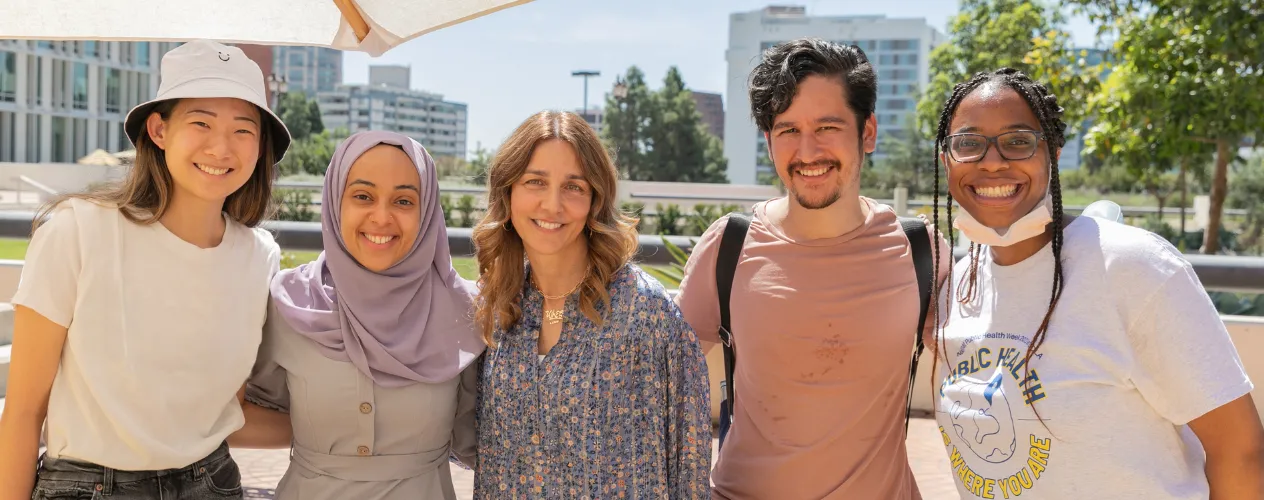Equity, Diversity & Inclusion
at UCLA Fielding

UCLA acknowledges the Tongva peoples as the traditional land caretakers of the Los Angeles basin. As a land grant institution, we pay our respects to the ancestors, elders and relations of the past, present and emerging.
The pursuit of equity, diversity, and inclusion (EDI) is a cornerstone of public health and at the core of the UCLA Fielding School of Public Health’s identity. It is woven into the fabric of all of the school’s priorities — from recruitment, teaching, and training to research, community collaboration, and everyday interactions within the confines of the school and outside of it. UCLA Fielding recognizes the legacy of the nation’s long and continuing history of structural racism, anti-Blackness and white privilege, and exclusionary practices in higher education. As educator and civil rights activist Dr. Angela Y. Davis put it, “In a racist society, it is not enough to be non-racist, we must be anti-racist.” To that end, FSPH is deeply committed to transformational change that builds a more equitable system.
At UCLA Fielding, the goal is to foster a community of inclusion in which historically and socially marginalized and underserved students, staff, and faculty are represented, respected, and in positions to effect change. The school has resolved to create an anti-racist environment in which all BIPOC (Black, Indigenous, People of Color) FSPH community members feel a true sense of belonging; that their work is valued; that the school’s curriculum and culture are reflective of their identities; and that they are nurtured toward maximum growth. Beyond the essential nature of this work at UCLA Fielding, enacting this cultural shift will prepare graduates to address inequities of health, access, and power in our society.
The school’s EDI efforts are impact-driven. They fall broadly into these categories:
-
Pathways and Recruitment
UCLA Fielding strives to further diversify the school community at all levels by improving the recruitment and retention of BIPOC, LGBTQ, first-generation, and other historically and socially marginalized and underserved students, faculty, and staff. This includes building robust outreach, recruitment, and retention pathways to public health and FSPH for these communities at the high school, undergraduate, graduate, and postgraduate levels.
-
Community and Belonging
FSPH seeks to promote community by enhancing faculty, student, and staff awareness and understanding of frames of difference that include dimensions such as race, ethnicity, socioeconomic status, class, gender, sexual orientation, religion, disability, age, language, nationality, citizenship status, and place of origin. This is accomplished, in part, by creating intentional spaces where historically and socially marginalized communities are seen, heard, and respected. The school also strives to build a culture of belonging for faculty, students, and staff, with a focus on incorporating BIPOC scholarship and honoring BIPOC community members’ self-worth and self-efficacy.
-
Teaching and Development
Through training of all FSPH community members, the school aims to establish a foundation of understanding and a common language for addressing and combating racism and privilege. Workshops and tools assist faculty in making the necessary improvements to pedagogy and mentorship, as well as creating more inclusive classrooms. It is critical to ensure that FSPH teaching and scholarship reflects these values, and so the school has instituted an ongoing process of curricular review. Among other actions, steps have been taken to incorporate anti-racism — the process of identifying and eliminating racism — into the school’s core course curriculum, as well as representing diverse voices from BIPOC, LGBTQ, and first-generation scholars, researchers, and faculty.
-
Infrastructure and Policy
The school is also focused on building a sustainable EDI infrastructure, equipped with resources and funding to implement and maintain systemic change. Establishing accountability measures and obtaining community input on the most effective practitioner grants will help to provide a financial base to maintain this work.
In all of the school’s EDI-related initiatives and activities, there is ample opportunity for students, staff, and faculty to get involved through school-wide and departmental EDI diversity committees, as well as affinity and anti-racist study groups. In addition, through the EDI Fellows program, students at UCLA Fielding engage with a social-justice lens in community-based public health efforts. In addition, the school brings in external advisers consisting of FSPH graduates, community leaders, campus partners, and national experts.
Meeting these critical goals requires broad-reaching and continuous efforts. Although immediate, small shifts can make an impact, transforming the culture requires a reimagining of systems and the development of new blueprints. UCLA Fielding will not relent in its determination to create a community that fully reflects one of the world’s most diverse cities — one that embraces and supports all of its members while they are at FSPH, and long after they leave. The work that lies ahead is humbling, but a truly equitable, diverse, and inclusive community is both achievable and foundational to the school’s mission.
-
Meet the Team
Janae Hubbard
Assistant Dean
jhubbard@ph.ucla.edu
310.794.3530
view profileCourtney S. Thomas Tobin
Associate Dean
courtneysthomas@ucla.edu
310.325.3738
view profile